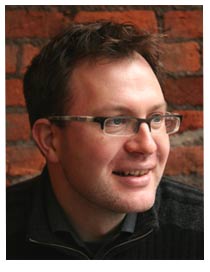Soundtrack for modern life
Wed, 09 Nov 2011 15:14:00 GMT
 THE music department at the University of Huddersfield is a centre for world-leading research and creativity. And it is helping to soundtrack the modern world in more ways than many people might imagine.
THE music department at the University of Huddersfield is a centre for world-leading research and creativity. And it is helping to soundtrack the modern world in more ways than many people might imagine.
For example, Monty Adkins (pictured) – newly appointed professor – is a leading composer of electronic music, whose works have been performed and recorded around the world in specialist festivals, venues and studios. But, in collaboration with his wife, Rose Dodd, he has also produced music and sounds for iPad apps, computer games and electronic toys.
Meanwhile, former students have moved into the field of sound design for companies such as Nintendo and Playstation, and have scored for TV documentaries.
The result is that thousands of people who might not consider themselves to be aficionados of contemporary electronic music are constantly absorbing and experiencing experimental sounds of the sort being developed by staff and students in the music and music technology department at Huddersfield.
“The music created in this building is definitely becoming part of the wider musical language,” says Professor Adkins. The process is aided by the range of musical influences within the department – from challenging contemporary art music to freeform jazz and electronic dance music.
There are clear intersections between all of these styles, says Professor Adkins, whose passion for electronic music and composition began in an early 1990s world of tape machines, effects units and mainframe computers, when it might take hours to upload and process strange new sounds and samples. Now a laptop can carry out the same tasks almost instantly.
This new freedom carries a few dangers. “Today’s software enables you to work so quickly and finish things so often that you can be somewhat uncritical of the results,” said Professor Adkins.
One of the teaching challenges, then, is to encourage students to listen to their work in a critical and concentrated manner – using the department’s exceptionally well-soundproofed studios and fine quality speaker systems – and therefore replicate the approach that Monty Adkin learned in an age of slower technology.
He has been a composer since his schooldays and developed his interest in electronic music when studying at the University of Cambridge. After a Masters in Birmingham and a year at the Dublin Institute of Technology, he came to the University of Huddersfield in 1998, continuing a burgeoning compositional career that has seen him carry off more than a dozen international prizes.
His electronic and electro-acoustic works have been performed in four continents and he has entered into a number of collaborations with instrumental performers and visual artists. For example, he is currently working with the painter Pip Dickens, with whom he won a Leverhulme artist-in-residence grant, on a project which will see her pictures exhibited to the accompaniment of music composed in response .
But Prof Adkins’s style of composition has undergone at least one major transformation. Until 2006 he specialised in acousmatic music – “a type of electronic music that is quite abstract, very esoteric; quite difficult for the ordinary listener”. But a two-semester stay in New Zealand, with its wide open spaces and sparse population altered his outlook.
“It was one of those life-changing moments. Since then my music has been quieter , more introspective, very detailed, very organic. It is very quiet music that draws the listener in”.
Just as his own style underwent a major change of direction, Prof Adkin does not attempt to impose any musical dogma on his students.
“I have always adopted the approach that there is no one school of composition, there is no right way of teaching things. When a student brings me something, my job is to try and introduce them to other music in order to get them to listen slightly more widely. I will talk them to them about how to shape their music and hopefully suggest something which can offer them some new insights, so that they can grow compositionally within their own language.”







